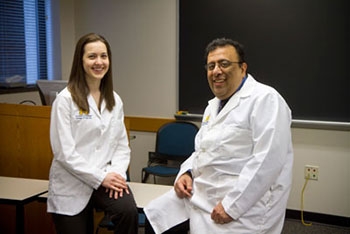Student-Faculty Partnership
 Fourth-year PharmD student, Melanie Engels, traces her interest in teaching to her undergraduate years at Olivet College. Not only was she a teacher's assistant in general chemistry and organic chemistry, she also helped redesign an integrated technology and humanities course which is a core requirement at the small liberal arts school.
Fourth-year PharmD student, Melanie Engels, traces her interest in teaching to her undergraduate years at Olivet College. Not only was she a teacher's assistant in general chemistry and organic chemistry, she also helped redesign an integrated technology and humanities course which is a core requirement at the small liberal arts school.
So when the College launched a revised PharmD curriculum in 2010, Engels was eager to help faculty find out just how well the new courses measured up.
With medicinal chemistry faculty advisor, Mustapha Beleh, PhD, Engels studied a variety of issues related to Medicinal Chemistry 415—the first in a newly integrated three-course medicinal chemistry and pharmacology series.
The purpose of their research project was to measure: how successful the content integration had been; the optimal number of instructors to team-teach the course; the value of the remediation plan which had been built into the course; and the impact of recitation sessions.
Each area was evaluated using student focus groups and Facebook discussion groups; interviews with faculty and graduate student instructors; an end-of-year survey of students who took the course; and student performance on quizzes and examinations.
"When I took these same courses a few years ago, pharmacology and medicinal chemistry didn't line up well as they were taught at the same time, but separately," explains Engels. "Our research revealed general student satisfaction with how well the med-chem and pharmacology content had been integrated. I know that I would have benefitted from integration of these two disciplines."
Because Engels maintained a dialogue with students throughout winter term 2011, faculty were able to make improvements while Medicinal Chemistry 415 was being taught. So, for example, when students said they learned more from large group recitation sessions than they did from small group recitations, faculty switched to the large-group format.
All part of the service, Beleh says.
Among other student-initiated suggestions being considered, College medicinal chemistry faculty are exploring the possibility of having just one or two faculty members write examinations. Students believe this would help clarify what content they are expected to know, and will be graded on.
One unmistakable finding was that students who participated in the Medicinal Chemistry 415 remediation plan showed marked performance improvement on the final exam covering the same material. This finding may result in adding remediation elements to other courses, Beleh explains.
Engels and Beleh have co-authored a paper on their research and plan to submit it for publication sometime this spring.
Has Engels' research experience with Beleh whetted her appetite for even bigger things in academia?
"Definitely," she nods.
At this writing, Engels was exploring residency opportunities with a preference for those with a teaching component. Her long-term goal is to pursue a career in clinical pharmacy and to pair it with a faculty appointment.
"I learned so many things applicable to teaching from my investigations project with Dr. Beleh," reflects Engels. "Our goal was to get students involved in their education, and then to conduct studies to see which approaches produce the best results. I learned a lot about communication techniques, teaching methods, and how to take the lead in learning situations. It was really exciting to be part of research with such immediate and tangible results."
Engels figures that the insights she gained from her PharmD investigations project will also help her as a clinical pharmacist when she is called upon to counsel and lead patients toward desired health outcomes.
Beleh has no doubt that Engels will find a great future no matter where she practices.
"Melanie's contribution to this research project and to the medicinal chemistry and pharmacology course sequence is invaluable," he explains. "I am very impressed with the innovative ideas and approaches she brought to the table, her hard work throughout the research project, and the important findings that have led to many changes in the course sequence. Her findings related to the remediation plan may have far reaching consequences as many colleges of pharmacy struggle with the concept of remediation."



